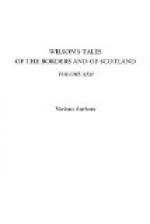My father, whom I had left a long way behind, came up to us while we were locked together in this silent embrace, and stood by us for a few seconds without speaking a word, then passed quietly into the house, leaving us to ourselves.
“My son, my son!” exclaimed my mother, so soon as the fulness of her feelings would allow of utterance, “you have been cruel, cruel to your mother. But I will not upbraid you. In seeing you again—in clasping you once more to my bosom—I am repaid a thousandfold for all you have made me suffer.”
With what further passed between us, I need not detain the reader.
The tender expressions of a mother and son meeting under such circumstances as we met, being the language of nature, the embodiment of feelings which all ran conceive, there is no occasion for dilating on them in my particular case. I pass on to other things of more general, or at least more uncommon interest.
The first day of my arrival at my father’s farm was passed entirely within doors in social communion, and in bringing up that arrear of interchange in thought and feeling which our separation for so long a period had created.
On the following day I commenced work with my father; and although I had done my duty faithfully by both the masters I had served since I came to New South Wales, I soon found the difference between compulsory and voluntary labour.
In the former case I certainly wrought diligently, but as certainly not cheerfully. There was an absence of spirit that quickly gave rise to listlessness and fatigue, and that left the physical energies weak and languid, in the latter case, it was far otherwise. Toil as I might, I felt no diminution of strength. I went from task to task, some of them far harder than any I had yet encountered, with unabated vigour, and accomplished with ease double the work I ever could get through with when in bondage.
The joint labours of my father and myself, assisted occasionally by hired service—for he could not endure the idea of having convicts about him—soon put a new and promising face on the farm.
We cleared, we drained, we enclosed, and we sowed and planted, until we left ourselves comparatively little to do—I mean in the way of hard labour—but to await the returns of our industry.
It was some time after we had got things into this state—that is, I think about three months after I had joined my father—that the latter received intelligence of a band of bushmen or bushrangers having been seen in the neighbourhood. He was assured that they were skulking in the adjoining forest, and that we might every night expect our house to be attacked, robbed, and ourselves, in all probability, murdered.
This information threw us into a most dreadful state of alarm; these bushrangers, as the reader probably knows, being runaway convicts, men of the most desperate characters, who take to the woods, and subsist by plundering the settlers—a crime to which they do not hesitate to add murder—many instances of fearful atrocities of this kind having occurred.




